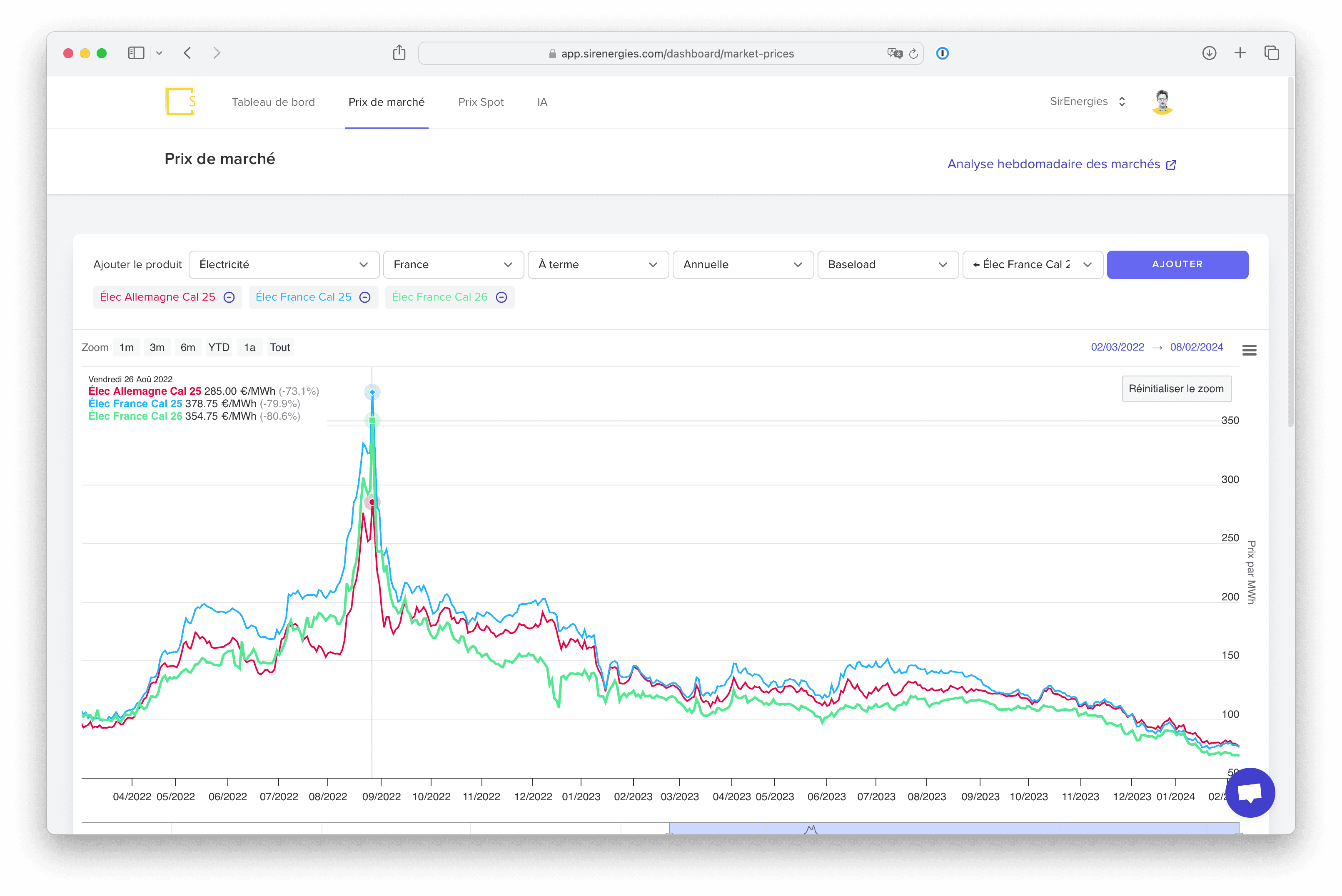

October 2, 2025
8
Min reading

Is there a good time to buy your electricity and gas? The answer is yes. But it is unique to each business. The challenge? Know how to seize the right opportunity.
It depends on several factors: electricity and gas prices, but also the consumption profile or contractual conditions.
How to identify the best period to negotiate your company's energy contracts? How to build your energy purchasing strategy, compare offers and save money on your electricity and gas bills?
Focus on best practices to properly negotiate your energy purchases.
Any negotiation is prepared in advance. Do you want to exchange on an equal footing with energy suppliers and be able to compare offers? Understanding your current contracts and your energy consumption is an essential prerequisite for optimizing and securing your energy purchases.
What kWh rates are you paying today? What is the duration of your contractual commitment with your supplier? Do the terms of your contract allow you to renegotiate or even cancel it, or do you have to wait for the scheduled deliveries to finish? Are there fees for changes or early cancellations?
Clarifying the pricing and contractual situation allows the company toidentify the opportunity and cost of renegotiating contracts.
Optimizing electricity and gas purchases requires know its annual energy consumption, as well as its periodic variations.
This complete and detailed analysis is essential for negotiating kWh prices, selecting the offer and pricing structure that best suits your needs, but also optimizing the TURP And the subscribed power.
This diagnosis is an opportunity to detect energy wastage and power overruns. Controlling consumption contributes to the control of energy costs.
Are you considering thermal insulation work on your buildings? You have a project ofPhotovoltaic self-consumption ? Are you planning to expand your premises or acquire new electrical equipment?
A company's energy consumption is subject to fluctuations over time. When you buy energy, you must anticipate the increase or decrease in your needs. The risk? Subscribe to an offer that would become unsuitable after a few months.
Do the contractual conditions allow you to modify or cancel your energy contract? Be on the lookout for opportunities and observe the fluctuations in electricity and gas prices. However, this monitoring requires a good understanding of the complex mechanisms of energy markets.
Energy suppliers source their electricity and gas on European wholesale markets. Transactions are organized:
As in any market, prices fluctuate depending on supply and demand. They are also influenced by other factors: the production cost of the last power plant called, the prices of other financial markets (oil, CO2) or the geopolitical context.
On the energy markets, two types of products are traded.
Spot products are purchased by energy suppliers on the Spot market for same-day delivery (sub-daily products, Intraday or Within Day) or the next day (daily products or Day-Ahead).
The price of Spot products is particularly volatile. The price of electricity is fixed every day before 13:00 according to supply and demand almost in real time.
Forward products are purchased by suppliers on wholesale markets several weeks, months, or even years before actual delivery. The price per MWh is fixed and negotiated at the signing of the contract.
In electricity, a distinction is made between baseload products, for businesses that require consistent power all year round, and peakload products, for businesses that call for power mostly from 8 am to 8 pm from Monday to Friday.
For more information, see our dedicated article: Spot and Forward Prizes: What are the differences?
Analyzing the evolution of prices on the markets is the key to identifying the best time to buy your electricity and gas.
Innovative and intuitive, the SirEnergies application offers access to key indicators to manage your energy management.
By simple registration, you can see in complete transparency the market price, as well as the Spot price the next day. In addition, our newsletter deciphers the trends in the electricity, gas and CO2 markets every week.

Monitoring of market prices (electricity, gas) - Source: SirEnergies
An energy consulting firm, SirEnergies provides businesses with An energy management application.
Thanks to the monitoring of electricity and gas prices and the real-time vision of energy consumption, it allows proactive and agile energy management.
While energy markets are complex, they have paved the way for the construction of tailor-made electricity and gas contracts for professional customers.
The fixed offers are indexed to the forward market. They guarantee the company a constant rate for the duration provided for in the contract.
The advantage: you benefit from a long-term visibility on your energy budget. You also protect your business from rising electricity and gas prices. What's at stake? Buy energy when the negotiated fixed rate is the most attractive.
On the other hand, the price per kWh is often higher, as it includes the provider's margin of safety. In addition, you are not taking advantage of lower prices in the markets.
Indexed offers are indexed to the Spot price. The price per kWh varies every day according to supply and demand in almost real time. If they are very volatile, these offers allow the company to make great savings when the price of electricity is close to 0 euros. On the other hand, The price increases are brutal for the budget.
Mixed offers combine forward and spot products.
In practice, few contracts are 100% indexed to Spot products due to financial risks. The majority of indexed offers include a portion of secure purchases on the long-term market and a share of riskier purchases on the spot market.
Electricity purchases are subject to choice of rate options. Businesses can opt for:
The choice of this tariff option is strategic to control the cost of energy purchases according to the periods.
Each business is unique. Your energy needs vary according to your sector of activity, your energy strategy and your projects. While it's impossible to write down the perfect recipe for a good energy purchasing strategy, here are some tips to guide your negotiations.
In your energy contract, you can negotiate the prices per kWh and the subscription price. But not only that. Many other points are negotiable:
Time is a key element in a negotiation. You will feel more comfortable negotiating your energy contract if you anticipated. This gives you time to talk to your electricity supplier and to allow the competition to take full advantage of.
A few days before the end of the contract, you are no longer in a position of strength. You risk rushing to compare offers and neglecting market price analysis. Once the tacit renewal date has passed, you will have to wait for the next deadline to negotiate with your supplier.
Group purchasing of energy consists of grouping several consumers with similar consumption profiles to buy electricity and gas. The supply of large volumes of energy appeals to suppliers, who are more likely to negotiate advantageous rates and contract terms.
Group buying is organized by an intermediary. After identifying interested consumers, he negotiates directly with energy suppliers the terms of their future electricity or gas contract. Proposals are presented to the members of the group, who can accept or refuse the offer.
Group purchasing of energy is an attractive strategy. It frees up the constraints of negotiating and analysing offers. On the other hand, Group buying does not make it possible to build a tailor-made offer, perfectly adapted to the specific needs of the company.
Spot and forward products, price options, fixed or indexed offers, price fluctuations... : energy markets are complex. Determining the right buying strategy and the right time frame to negotiate is tricky.
However, energy is a strategic area which weighs on the company's finances. Using an energy consulting firm assures you of successful purchases.
An energy consulting firm adapts to your consumption profile. The expert takes into account the specificities of your business to build a tailor-made purchasing strategy and negotiating customized electricity and gas contracts.
Responsive and agile, experts analyze market prices for their customers. They decipher your consumption, anticipate your needs, identify opportunities and negotiate with energy suppliers. Careful, they compare every detail of the offers offered to guide you towards the most advantageous contract.
With an energy consulting firm, you benefit from a personalized long-term follow-up, with a single objective: to always better optimize your purchases and your energy costs.
The energy consulting firm provides you with its digital solutions to support you in decision-making.
With a real-time view of consumption data and electricity and gas prices, the SirEnergies application is the the basis for proactive energy management. Thanks to a good understanding and good foresight, you manage your risks and control your energy costs over time.
Energy purchases require a perfect knowledge of your company's energy consumption and a thorough understanding of market mechanisms and offers. Choosing the right strategy and the right time are two key levers for securing your contracts, controlling your energy costs and reducing your electricity and gas bills.
An energy consulting firm, SirEnergies assists you in negotiating your energy purchases, in complete transparency and trust.
Thanks to our community of experts, our large network of suppliers and our innovative and intuitive tools, we support you over the long term to build a tailor-made energy purchasing strategy and implement concrete solutions to optimize your electricity and gas contracts.

.png)

Some businesses may obtain a partial or total exemption from the TICFE or the TICGN, depending on their activity and energy intensity. The support of an expert makes it possible to identify the eligibility criteria and to put together the file.
.png)

Un appel d’offres permet de mettre en concurrence plusieurs fournisseurs d’électricité et de gaz afin d’obtenir des conditions contractuelles optimisées. C’est une démarche transparente qui permet de choisir l’offre la plus adaptée aux besoins budgétaires et techniques de l’organisation.
.png)

Farms must deal with high seasonal needs (greenhouse heating, irrigation, storage) and high volatility of prizes. Controlling these costs is essential to maintain profitability and secure the business.
.png)

Car les marchés dépendent de facteurs exogènes imprévisibles (géopolitique, météo soudaine, politique) que les modèles basés sur l'historique ne peuvent pas anticiper, tout comme on ne prédit pas le Loto.
.png)

Chaque modèle d'IA répond à un besoin spécifique du cycle d'achat :
L'expertise humaine reste néanmoins indispensable.
.png)

Changing suppliers can allow you to benefit from more competitive prices, adapted services or better contractual conditions. Thanks to sourcing, change is happening without interruption of supply.
.png)

Même le bâtiment le plus moderne et le mieux isolé perd son efficacité si ses usages sont inadaptés. La technologie et les normes ne suffisent pas : la transition énergétique est avant tout une transformation humaine.
Derrière chaque kilowattheure consommé se cache une habitude.
Un collaborateur sensibilisé comprend qu'ouvrir une fenêtre alors que le chauffage est allumé ou laisser un ordinateur en veille consomme de l'énergie inutilement. En replaçant l'humain au centre de la stratégie de gestion de l'énergie, l'entreprise s'assure que ses équipements performants sont utilisés de manière optimale, garantissant ainsi une rentabilité durable et un impact environnemental réduit.
.png)

One invoice consists of several elements: consumption, supplier share, taxes and contributions. The analysis of each line makes it possible to identify possible errors and to check the consistency with the signed contract.

